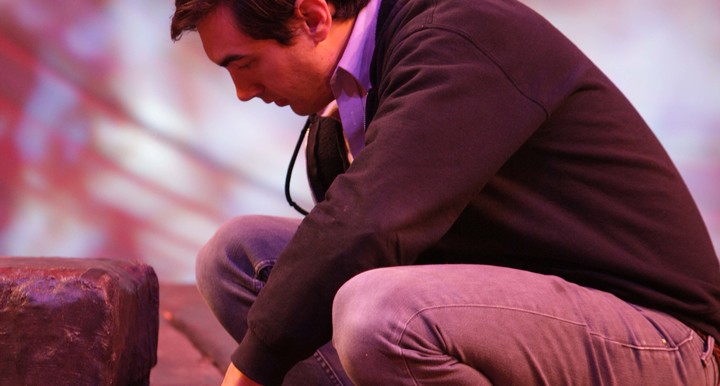Mitchell Southerland, recent University of Oklahoma graduate and USITT Early Career member, talks about his USITT experience, how he landed his first industry job, and advice to those just starting out.
USITT: How did USITT become a part of your life?
When I joined the theatre department at the University of Oklahoma, we had a USITT Chapter that hadn’t really been thriving. It was kind of stagnated and in need of someone to really take the reins and kind of rebuild the Chapter.
Fortunately, I had a really great mentor at OU, USITT member and VP of Education & Training Kasey Allee-Foreman. She was really active in USITT, and she really gave me my first rundown on it. But then it was up to me to go to the website and do the research and find out what we needed to do to get our charter back because it had lapsed.
It was really reinforced for me the first spring when I went to the USITT Annual Conference & Stage Expo which was in Milwaukee and saw essentially a big old convention space filled with like-minded theatre people. It reinforced in me the notion that what we were doing was important at OU.
Do you recall one USITT experience that really stood out for you?
This last year was really different for me just because it was my first year as a full-time production manager with Music Theatre Wichita. It was kind of a full circle thing because, at my first Conference, I was incredibly intimidated by the amount of people and the amount of things that were going on. There were just so many workshops happening, so many opportunities, I just didn’t realize what some of those opportunities were at the time.
Now, I can’t walk down the hallway without meeting somebody I haven’t seen in a year or two! It’s like we never left, but that’s kind of the way theatre is. You go long periods without seeing people, but then you see them, and it’s great to see them. The Cincinnati one was really fun. I find each year it gets better!
How did you get interested in production management?
I’ve always had a mind for efficiency and for relating well to people and kind of bringing out the best in people. I found that the best way I could use people’s talents and let them grow was to have a role in management of some sort.
In production management, you have to have a little bit of knowledge of just about everything, which is something that appeals to me. They bring these incredibly talented people and sit them down in the same room and say, “Here’s how we’re going about it. Here’s how we’re approaching the problem.”
USITT has given me an opportunity to meet these extremely skilled people. Being a member of USITT and going to these Conferences — reaching out through social networking and email, I’m able to keep in touch with people who are the real movers and shakers in the industry.
What was the timeline from graduation to your current employment?
The summer after my senior year of college, Jeff Taylor offered me an opportunity to come and be the assistant production manager at Music Theatre Wichita. I did that for three months and then my contract ended. I moved up to Chicago and managed to land an internship at the Goodman Theatre working under Scott Conn. I did that for nine months and for three months I freelanced around doing some AV work.
The summer came up again and Jeff was still the production manager at Music Theatre Wichita, so I said I’d work three more months. At the start of the summer, Jeff pulled me aside and said, “I think this is it for me. I think I’m done after this year and the company is going to be looking for a new production manager.” When the summer ended and he was done, I was offered a job by the artistic director.
I was incredibly lucky to get what I have, and I’m thankful.
What advice would you give to a recent graduate looking to land a career in the industry?
You always have to be building your network, take every opportunity you have to bump into another professional. These are people who you will inevitably be working with in some way shape or form, so every conversation is a networking conversation essentially. Even if that’s not the intent.
Also, something I feel very passionate about is that, if ever you’re working with somebody or engaged in a creative endeavor with somebody, your attitude counts for probably eight-tenths of what you’re doing. I would rather hire somebody who doesn’t know everything and knows they don’t know everything but has a positive attitude because that’s somebody I know that I can work with! We work so quickly and so closely with each other, nobody has time for somebody with a bad attitude. So, attitude is so super important for me.
